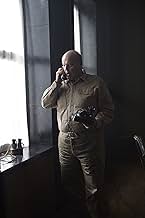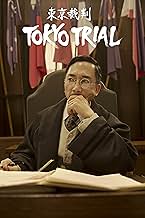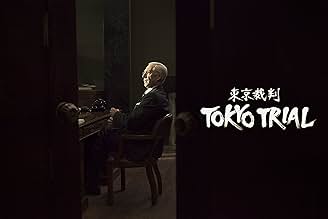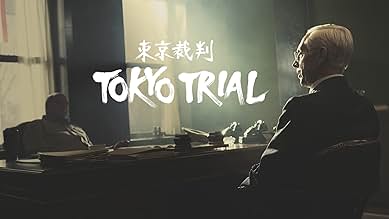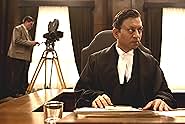Tokyo Trial
- TV Mini Series
- 2016
- 50m
IMDb RATING
7.3/10
2.1K
YOUR RATING
A historical drama that focuses on a decade-long investigation into events in the Pacific during and after WWII.A historical drama that focuses on a decade-long investigation into events in the Pacific during and after WWII.A historical drama that focuses on a decade-long investigation into events in the Pacific during and after WWII.
- Awards
- 1 win & 1 nomination total
Browse episodes
Featured reviews
This is a fascinating, well made four-part miniseries. I watched it on Netflix over four days, but it's so good, I can see how one might want to binge watch it. It reminded me of Twelve Angry Men.
In 1946, eleven Allied Judges were appointed to The International Military Tribunal for the Far East (IMTFE), aka Tokyo Trial or Tokyo War Crimes Tribunal. Their job was to try twenty-eight Japanese leaders for conventional war crimes and crimes against humanity. I didn't know anything about this trial.
The participating countries were: Australia, Canada, China, France, British India, the Netherlands, New Zealand, the Philippines, the Soviet Union, the United Kingdom, and the United States. Later a twelfth judge from India was added. These dedicated, but very different men, (yep, all men in those days), had legal and moral clashes with regards to how to stay true to the law, remain impartial, and prevent similar atrocities.
This tribunal would form the foundation of how "war as a crime by individuals" would be judged in the future. It had previously existed only part of the Paris Peace Pact of 1928. They ran into a problem with war crimes being ascribed only to a Nation and not to an individual.
There is infighting, cliques, power struggles, and schisms amongst the judges. Pal and Röling are outspoken in their dissent, which created an interesting narrative. Röling is the main protagonist; we get a glimpse into his creative relationship with German pianist Eta Harich-Schneider.
Many of the accused were found guilty, including former Prime Minister Hideki Tojo.
I listed the judges to keep track of them.
In 1946, eleven Allied Judges were appointed to The International Military Tribunal for the Far East (IMTFE), aka Tokyo Trial or Tokyo War Crimes Tribunal. Their job was to try twenty-eight Japanese leaders for conventional war crimes and crimes against humanity. I didn't know anything about this trial.
The participating countries were: Australia, Canada, China, France, British India, the Netherlands, New Zealand, the Philippines, the Soviet Union, the United Kingdom, and the United States. Later a twelfth judge from India was added. These dedicated, but very different men, (yep, all men in those days), had legal and moral clashes with regards to how to stay true to the law, remain impartial, and prevent similar atrocities.
This tribunal would form the foundation of how "war as a crime by individuals" would be judged in the future. It had previously existed only part of the Paris Peace Pact of 1928. They ran into a problem with war crimes being ascribed only to a Nation and not to an individual.
There is infighting, cliques, power struggles, and schisms amongst the judges. Pal and Röling are outspoken in their dissent, which created an interesting narrative. Röling is the main protagonist; we get a glimpse into his creative relationship with German pianist Eta Harich-Schneider.
Many of the accused were found guilty, including former Prime Minister Hideki Tojo.
I listed the judges to keep track of them.
- Tim Ahern as Major General Myron C. Cramer (United States)
- Paul Freeman as The Honourable Lord William D. Patrick (United Kingdom)
- Serge Hazanavicius as Henri Bernard (France)
- Marcel Hensema as Professor Bert V.A. Röling (Netherlands)
- Jonathan Hyde as President Sir William Webb (Australia)
- Irrfan Khan as Radhabinod Pal (India)
- Stephen McHattie as Edward Stuart McDougall (Canada)
- David Tse as Mei Ju-ao (China)
- Julian Wadham as Sir Erima H. Northcroft (New Zealand)
- Bert Matias as Colonel Delfín Jaranilla (Philippines)
- Kestutis Stasys Jakstas as Major General I.M. Zaryanov (Soviet Union)
- William Hope as John P. Higgins (United States)
This is one of the finest courtroom dramas after 12 Angry Men. There is never over the top sentimental (or) emotional narrative despite the subject taken is highly sensitive. This is exactly how judges go about and come to their conclusion inspite of political interference. Fanstically made series based on true history!! Must watch for every Management aspirants!
Good history, fine acting. The moral nuances become very real as the Justices deliberate. I expect my attorney friends will really like this. For the most part the film succeeds in avoiding black and white characters and draws out the complexities of personalities and values. This is not a thriller, more of a morality play based on real high-stakes deliberations. The casting for General MacArthur was a minus, not because of the acting, there was little meat in the role, but there must be thousands of actors who would look like MacArthur and could handle this role. No one else's likeness was relevant, who knew the judges? But...
Far less remembered than the Nuremberg trials, the Tokyo Trials were nonetheless a turning point in Asian history. This series brilliantly brings out the factors at play during the trial, not least the Colonial history of the Allies.
All characters are thoughtfully portrayed and excellently played, but it's Irrfan Khan as justice Pal who provides the philosophical backbone to the story. He's a last minute addition from India because the Allies wanted some (token) Asians, but ironically India was then still a British colony. The proud Philippine judge, the questioning Dutchman, the British judge who still has a case of colonial hangover: these traits are portrayed through nuance rather than caricature.
Asia still lives in the aftermath of the wounds that the war opened. While the trials drew a line under one traumatic incident, what has followed in the 80 years since almost directly follows those events.
I'm thankful for the show being made and for exploring dissenting opinions. In a time where infantile soaps like Stranger Things are the norm on Netflix, this series was a delight, and it should be to anyone interested in history in general, and Asian history in particular.
All characters are thoughtfully portrayed and excellently played, but it's Irrfan Khan as justice Pal who provides the philosophical backbone to the story. He's a last minute addition from India because the Allies wanted some (token) Asians, but ironically India was then still a British colony. The proud Philippine judge, the questioning Dutchman, the British judge who still has a case of colonial hangover: these traits are portrayed through nuance rather than caricature.
Asia still lives in the aftermath of the wounds that the war opened. While the trials drew a line under one traumatic incident, what has followed in the 80 years since almost directly follows those events.
I'm thankful for the show being made and for exploring dissenting opinions. In a time where infantile soaps like Stranger Things are the norm on Netflix, this series was a delight, and it should be to anyone interested in history in general, and Asian history in particular.
I was in the United States Army, 1st Cav Division 8th Cav Regt. stationed in Tokyo when this trial was going on. I spent a lot of time with one of the defense attorneys. I attended the trial when I could. One of my interests while I was in Japan (for one and a half years) was to learn as much as i could about the war and the Japanese people. This series was very interesting to me, as it was seen through others eves, not just mine. The scenes of the city were not what I saw, and the General Mac Arthur character did not match up with the real General, who i saw many times. The Imperial Hotel sets brought me back to my first week in Tokyo, as one of my first stops in Tokyo was to visit Frank Lloyd Wright's Masterpiece, The Imperial Hotel.
To tell a story as complex as this one was, would take as many years as the trial took and in the end, I am sure we would not know or understand what actually happened and who was at fault. We do know that the Japanese lost the war but in the long run Japan was given a new start and the people of Japan were smart enough to make the most of it.
Did you know
- TriviaAll the furniture in the courtroom, hotel and restaurant sets were custom-built replicas made by the art and construction departments for use on the production in order for everything to look authentic.
- GoofsMajor General Cramer, Judge Advocate General (JAG) of the United States Army, is wearing the Corps of Engineers branch insignia instead of the JAG branch insignia.
- ConnectionsEdited into Tokyo Trial (2017)
- How many seasons does Tokyo Trial have?Powered by Alexa
Details
- Release date
- Countries of origin
- Official site
- Languages
- Also known as
- Токийский процесс
- Filming locations
- Didziasalis, Ignalina District Municipality, Lithuania(Post War Tokyo)
- Production companies
- See more company credits at IMDbPro
Contribute to this page
Suggest an edit or add missing content


